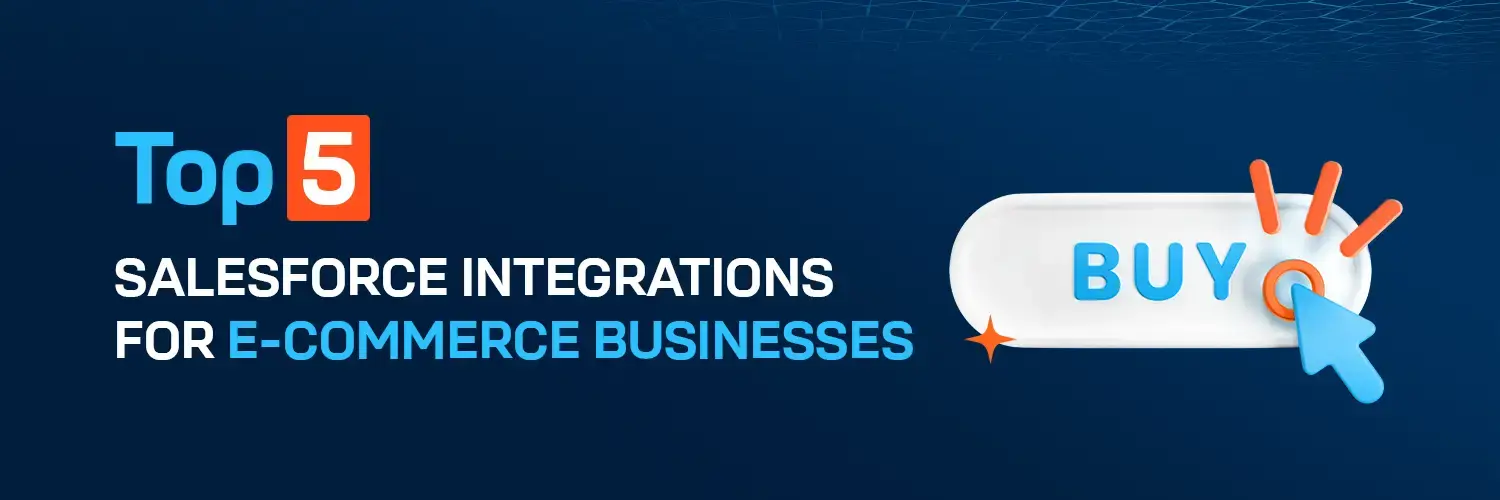
Running a successful e-commerce business today involves more than listing products and accepting payments. Behind the scenes, brands need real-time insights, personalized marketing, and frictionless operations to stay competitive. This is where a smart Salesforce eCommerce integration adds real value.
Salesforce, as a powerful CRM, doesn’t work in isolation. Its true potential is unlocked when integrated with the right third-party tools that power e-commerce. These integrations automate workflows, reduce manual effort, and give businesses a unified view of their customers.
Let’s explore the top five integrations that can help online retailers transform their operations, boost sales, and deliver exceptional customer experiences.
E-commerce platforms generate a large volume of data across multiple touchpoints. From customer behavior to product performance, the insights are valuable, but only if they’re properly captured and acted upon.
Salesforce stands out as one of the best CRMs for eCommerce due to its ability to centralize data and automate key functions. By integrating Salesforce with your e-commerce tools, you can:
Now, let’s explore the five most effective Salesforce integrations for online retail businesses and how each one can elevate your operations.
Shopify is one of the world’s most widely used e-commerce platforms. When integrated with Salesforce, it functions as more than just a sales channel and becomes part of a fully connected ecosystem.
Key Benefits:
This integration is ideal for businesses that want to streamline marketing and customer service. With Shopify handling the storefront and Salesforce managing relationships, brands can scale faster.
Magento (Adobe Commerce) is known for its flexibility and customizability. Integrating it with Salesforce allows businesses to align their online store with CRM workflows, sales pipelines, and automation tools.
How Magento Integration Helps:
Popular connectors like Magenest or Zapier make the process smoother without heavy coding. This integration is ideal for businesses managing large product catalogs or custom workflows.
Mailchimp is a trusted name in email marketing. Its integration with Salesforce lets businesses engage leads and customers through automated, personalized campaigns that feel timely and relevant.
Integration Features:
This setup is especially useful for nurturing long-term customer relationships and improving conversion rates.
Stripe is a modern payment gateway used by thousands of online retailers. By integrating it with Salesforce, businesses can merge payment data with customer and order records, giving teams a complete picture.
Why Stripe Integration Works:
This integration enhances order fulfillment accuracy and supports better customer service by eliminating the need to switch between tools.
Zapier acts as a bridge between Salesforce and thousands of other apps, especially those without native Salesforce integrations. For e-commerce businesses that rely on multiple tools, Zapier simplifies automation across the board.
What You Can Automate with Zapier:
This low-code integration is perfect for businesses with unique tech stacks or custom workflows that demand flexible automation.
With all these tools feeding into Salesforce, your e-commerce store becomes more than just a digital storefront. It transforms into a data-driven sales engine.
Benefits You Can Expect:
These capabilities make Salesforce one of the most adaptive platforms for online retail. Businesses that implement these integrations properly can expect smoother workflows and happier customers.
The right Salesforce eCommerce integration depends on your platform, team size, and business goals. Each integration listed here solves specific pain points, from customer targeting and order management to real-time reporting.
If you're looking to enhance customer journeys, automate backend operations, and drive more sales, Salesforce integrations for online stores are worth the investment.Ready to scale your online business with tailored Salesforce solutions?
Q1: Is Salesforce suitable for small online stores?
Yes. Salesforce offers scalable solutions. Small businesses can start with basic plans and expand integrations as they grow.
Q2: How long does integration typically take?
It depends on the complexity of your systems. Standard integrations like Shopify can be completed in days, while ERP systems may take a few weeks.
Q3: Can I use more than one integration at once?
Absolutely. Salesforce supports multiple integrations simultaneously, helping businesses create a unified ecosystem.
Q4: Is developer support needed for every integration?
Not always. Many platforms offer pre-built connectors or plug-ins. However, custom workflows may require developer assistance.
Copyrights © 2025 SMB Business Solution | All Rights Reserved
Designed & Developed by Digital Hyperlinks (PVT) LTD.